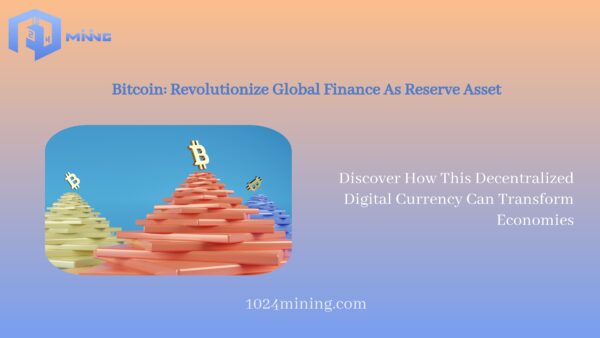In recent years, Bitcoin has gained significant attention as a potential global reserve asset. But what exactly does this mean, and why is it important? In this article, we will explore the concept of Bitcoin as a global reserve asset and its potential impact on the global economy.
What is a Global Reserve Asset?
A global reserve asset is a currency or asset that is held by central banks and other financial institutions as a means of international payment and to support the value of their own currency. These assets are typically considered to be stable and widely accepted, making them a reliable store of value.
The most well-known global reserve asset is the US dollar, which has been the dominant reserve currency since the end of World War II. Other reserve currencies include the euro, the Japanese yen, and the British pound.
The Potential of Bitcoin as a Global Reserve Asset
Limited Supply and Decentralization
One of the main reasons why Bitcoin has the potential to become a global reserve asset is its limited supply. Unlike fiat currencies, which can be printed at will by central banks, there will only ever be 21 million bitcoins in existence. This scarcity makes it a desirable asset for central banks looking to diversify their reserves.
Additionally, Bitcoin’s decentralized nature is seen as a positive attribute for a global reserve asset. Unlike traditional currencies, which are controlled by central authorities, Bitcoin is not subject to government manipulation or interference. This makes it a more stable and reliable store of value in the eyes of many investors.
Growing Acceptance and Adoption
Another factor contributing to Bitcoin’s potential as a global reserve asset is its growing acceptance and adoption. While it is still a relatively new asset, Bitcoin has gained significant traction in recent years, with more and more businesses and individuals accepting it as a form of payment.
In addition, major financial institutions and corporations have started to invest in Bitcoin, further legitimizing it as a viable asset. This growing acceptance and adoption could lead to increased demand for Bitcoin, driving up its value and making it a more attractive reserve asset.
Protection Against Inflation and Economic Uncertainty
Bitcoin’s decentralized nature and limited supply also make it an attractive asset for central banks looking to protect against inflation and economic uncertainty. As governments around the world continue to print money and increase debt, many investors are turning to Bitcoin as a hedge against inflation.
In addition, Bitcoin’s value is not tied to any specific country or economy, making it a more stable asset in times of economic uncertainty. This could make it an appealing option for central banks looking to diversify their reserves and protect against potential economic downturns.
Challenges to Bitcoin’s Adoption as a Global Reserve Asset
While Bitcoin has the potential to become a global reserve asset, there are also several challenges that could hinder its adoption.
Volatility and Lack of Regulation
One of the main challenges facing Bitcoin is its volatility. The price of Bitcoin has been known to fluctuate significantly, making it a risky asset for central banks to hold as a reserve. In addition, the lack of regulation and oversight in the cryptocurrency market could also deter some institutions from investing in Bitcoin.
Resistance from Traditional Financial Institutions
Traditional financial institutions, such as central banks and commercial banks, may also be resistant to adopting Bitcoin as a global reserve asset. These institutions have a vested interest in maintaining the dominance of traditional currencies, and may view Bitcoin as a threat to their power and control.
Limited Infrastructure and Accessibility
Another challenge facing Bitcoin’s adoption as a global reserve asset is the limited infrastructure and accessibility. While Bitcoin has gained significant traction in recent years, it is still not widely accepted as a form of payment and is not as accessible as traditional currencies. This could make it difficult for central banks to use Bitcoin for international transactions and payments.
The Potential Impact of Bitcoin as a Global Reserve Asset
If Bitcoin were to become a global reserve asset, it could have a significant impact on the global economy. Here are some potential effects of Bitcoin’s adoption as a reserve currency:
Reduced Reliance on Traditional Currencies
The adoption of Bitcoin as a global reserve asset could reduce the reliance on traditional currencies, such as the US dollar. This could lead to a more balanced global economy and reduce the dominance of a single currency.
Increased Stability and Security
Bitcoin’s decentralized nature and limited supply could also lead to increased stability and security in the global economy. As more central banks hold Bitcoin as a reserve asset, it could help to diversify their reserves and protect against economic downturns.
Greater Financial Inclusion
Bitcoin’s accessibility and lack of barriers to entry could also lead to greater financial inclusion. As more people and businesses adopt Bitcoin, it could provide access to financial services for those who are currently underserved by traditional banking systems.
Potential for Increased Economic Growth
The adoption of Bitcoin as a global reserve asset could also lead to increased economic growth. As more businesses and individuals use Bitcoin for transactions, it could lead to a more efficient and streamlined global economy.
Conclusion
While there are certainly challenges to overcome, Bitcoin has the potential to become a global reserve asset. Its limited supply, decentralization, and growing acceptance and adoption make it an attractive option for central banks looking to diversify their reserves and protect against economic uncertainty. If Bitcoin were to become a global reserve asset, it could have a significant impact on the global economy, leading to increased stability, financial inclusion, and economic growth.



